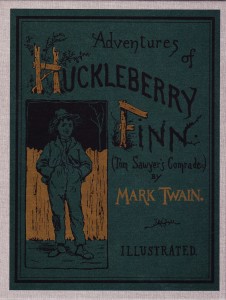 Since its first American publication on February 18, 1885, Mark Twain’s The Adventures of Huckleberry Finn has been the subject of praise and controversy. Following the adventures of Tom Sawyer’s lively comrade Huck Finn, the novel is among the first to be written in vernacular English common to the Antebellum South, language that contributed to its long history of being challenged, censored and banned from classrooms and libraries. In fact, Huck Finn remains one of the most banned books of all time, having been considered “too vulgar,” “racist,” and “socially offensive.”
Since its first American publication on February 18, 1885, Mark Twain’s The Adventures of Huckleberry Finn has been the subject of praise and controversy. Following the adventures of Tom Sawyer’s lively comrade Huck Finn, the novel is among the first to be written in vernacular English common to the Antebellum South, language that contributed to its long history of being challenged, censored and banned from classrooms and libraries. In fact, Huck Finn remains one of the most banned books of all time, having been considered “too vulgar,” “racist,” and “socially offensive.”
In many ways, Mark Twain was a man ahead of the times, understanding that the critical reception of his book would only draw more attention. After the Concord Massachusetts Public Library committee excluded Huck Finn from their selections in 1885, Twain told his editor:
“Apparently, the Concord library has condemned Huck as ‘trash and only suitable for the slums.’ This will sell us another twenty-five thousand copies for sure!”
To celebrate the anniversary of the novel’s enduring battle against censorship, CBLDF collected the following quotes and facts from the colorful, vibrant 129-year history of Huck Finn:
- The Adventures of Huckleberry Finn has been translated into more than 50 languages.
- It has never gone out of print since its original publication in 1885.
- More than 20 million copies have been sold
- Ernest Hemingway: “All American literature comes from one book by Mark Twain called Huckleberry Finn.”
- It took Twain more than eight years to complete Huck Finn, although he began writing it immediately after the publication of The Adventures of Tom Sawyer
- Upon learning that the Omaha Public Library refused to circulate his book, Twain replied with the following quote (a CBLDF favorite): “Censorship is telling a man he can’t have a steak just because a baby can’t chew it.”
- In 1905, librarian Asa Dickinson crusaded for the book after it was banned in many libraries, beginning a letter correspondence with Twain that she kept private her entire life.
- Langston Hughes on Huck Finn: “Mark Twain, in his presentation of Negroes as human beings, stands head and shoulders above the other Southern writers of his time.”
We need your help to keep fighting for the right to read! Help support CBLDF’s important First Amendment work by visiting the Rewards Zone, making a donation, or becoming a member of CBLDF!
Casey Gilly is a Contributing Editor for CBLDF, a Staff Writer for Comic Book Resources and, most importantly, a cat enthusiast.